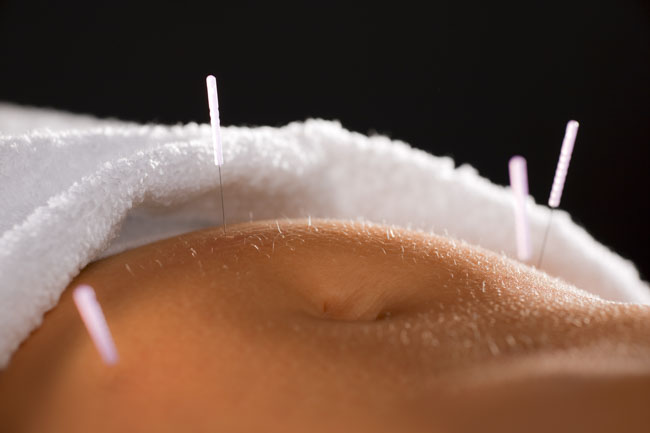Heilongjiang University of Chinese Medicine researchers find acupuncture and herbs a potent combination for relieving insomnia, hot flashes, mood swings, and fatigue in perimenopause patients. In a protocolized investigation, researchers developed a prescription of acupuncture points and herbs that synergistically improve positive patient outcomes. The combination of Chinese medicine treatment modalities provided significant relief to the patients in the controlled investigation.
Acupuncture and herbs alleviate perimenopausal symptoms. Researchers from Heilongjiang University of Chinese Medicine determined that a combination of acupuncture and herbs successfully relieve insomnia, hot flashes, mood swings, fatigue, and excess perspiration in perimenopausal women (Cong et al.). Although acupuncture and herbs were effective as standalone therapies, the combination therapy produced increased positive patient outcomes.
Acupuncture and herbal medicine therapy improved the Blatt/Kupperman scores in the test subjects. The Blatt/Kupperman index measures the severity of eleven menopausal symptoms: vasomotor conditions, paresthesia, insomnia, nervousness, melancholia, vertigo, weakness or fatigue, arthralgia and myalgia, headaches, palpitations, formication. This includes symptoms such as night sweating, cold hands and feet, hot flashes, shortness of breath, tingling in the extremities, depression, dizziness, joint pain, skin-crawling sensations, and exhaustion.

The acupuncture points used in the treatment protocol included the following acupoints:
Tianshu (ST25)
Zhaohai (KD6)
Neiguan (PC6)
Sanyinjiao (SP6)
Wushu (GB27)
Mild reinforcing and reducing manual acupuncture techniques were applied with patients resting in a supine position. Lifting, thrusting, and rotating were applied for thirty to sixty seconds after the arrival of deqi. Next, the needles were retained for thirty minutes and one more application of manual acupuncture techniques were applied during the needle retention time. Acupuncture was administered once per day for six days followed by a one day break to finish the week to comprise once course of care. In total, twelve courses of care were administered.
Herbal medicine was administered for ninety days. A decoction of the formula He Shu Geng Nian was prepared once daily and served in two portions, once in the morning and the other portion at night. The ingredients of He Shu Geng Nian are:
Chai Hu 10g
Huang Qin 10 g
Ban Xia 10 g
Gui Zhi 10 g
Long Gu 20 g
Mu Li 20 g
Bai Shao 15 g
Huang Bai 10 g
Bai He 15 g
Fu Xiao Mai 15 g
Tu Si ZI 30 g
Wu Wei Zi 15 g
Individually, acupuncture and herbs improved the Blatt/Kupperman scores. Together, acupuncture and herbs had and even greater effect-producing superior patient outcomes. Based on the data, the researchers conclude that acupuncture and herbal medicine are effective for the treatment of perimenopause related disorders.
Tan et al. had similar findings noting that acupuncture combined with herbal medicine "is a simple and effective clinical intervention for the patients with perimenopausal insomnia…." Acupuncture plus herbs produced a 96.83% total effective rate. Herbal medicine as a standalone therapy produced a 74.60% total effective rate. The acupuncture points used in the investigation were
Taixi (KD3)
Sanyinjiao (SP6)
Baihui (DU20)
Sishencong (EX-HN1)
Shenmen (HT7)
Shenmai (BL62)
Zhaohai (KD6)
The herbal formula used in the investigation was Zi Shen Tiao Gan Tang, prepared in a standard decoction. The ingredients of the formula are
Shu Di Huang 24 g
Huang Jing 9 g
Bai Shao 15 g
Gou Qi Zi 15 g
Tu Si Zi 15 g
Shan Zhu Yu 12 g
Bai Zi Ren 12 g
Fu Xiao Mai 20 g
Xiang Fu 12 g
Di Gu Pi 12 g
Zhi Gan Cao 9 g
The work of Tan et al. and Cong et al. are similar in that both research teams conclude that a combination of acupuncture plus herbs is clinically superior to using either modality as a standalone protocol. In a related study, Li et al. find acupuncture effective for relieving hot flashes during perimenopause. Citing several investigations in their meta-analysis, Li et al. note that acupuncture regulates the hypothalamic-pituitary-ovarian axis and levels of serum estradiol, follicle stimulating hormone, and luteinizing hormone. In addition, the researchers document that acupuncture is effective for the treatment of hot flashes.
The meta-analysis of Li et al. documents that yuan and back-shu (beishu) acupuncture points effectively regulate estradiol, FSH, and LH in perimenopausal patients (Shang et al.). Li et al. also cite the work of Qin et al. noting that electroacupuncture applied to SP6 regulates reproductive endocrine system functions in perimenopausal women.
Research quantifies the successes of acupuncture and herbs for the treatment of perimenopausal symptoms. Given the prevalence of patients with perimenopausal symptoms, it is reasonable that access to Chinese medicine therapy is an available treatment option. From symptoms ranging from hot flashes to insomnia, acupuncture and herbal medicine is a scientifically validated protocol for patient care.
References:
Cong HF, Gu XM & Wu WP. (2015). Clinical Observation of Acupuncture plus Medication for Perimenopausal Syndrome. Shanghai Journal of Acupuncture and Moxibustion. 34(4).
Li Y & Huang KJ. (2014). TCM prescription in treating perimenopausal syndrome, 50 cases. Journal of Liaoning College of Traditional Chinese Medicine. 16(5): 203-205.??
Tan KP, Yao X, Li XW. Observation on clinical effect of acupuncture plus Zi Shen Tiao Gan Decoction for perimenopausal insomnia. J Acupunct Tuina Sci, 2015, 13 (1): 49-53. DOI: 10.1007/s11726-015-0822-1.
Li, Rui-li, Jin-ying Fu, Ying-ying Deng, Wen-juan Shen, Hong-li Ma, Wei Li, and Xiao-ke Wu. "Review of acupuncture treatment for perimenopausal syndrome." Journal of Acupuncture and Tuina Science 2, no. 13 (2015): 129-133.
Shang YJ, Bhang Y, Kong LL, Wang YY, Wang DS, Li J. Clinical observation on combination of source point and Back-Shu point for treatment of perimenopausal syndrome. Zhongguo Zhen Jiu, 2009, 29(6): 444-448.

![Diseases, Symptoms, tcm, [tcmwindow.com]](/uploadFile/adImg/2015/11/11/f5cbfcc0-4df5-4646-9b9a-f316651a0199.jpg)





